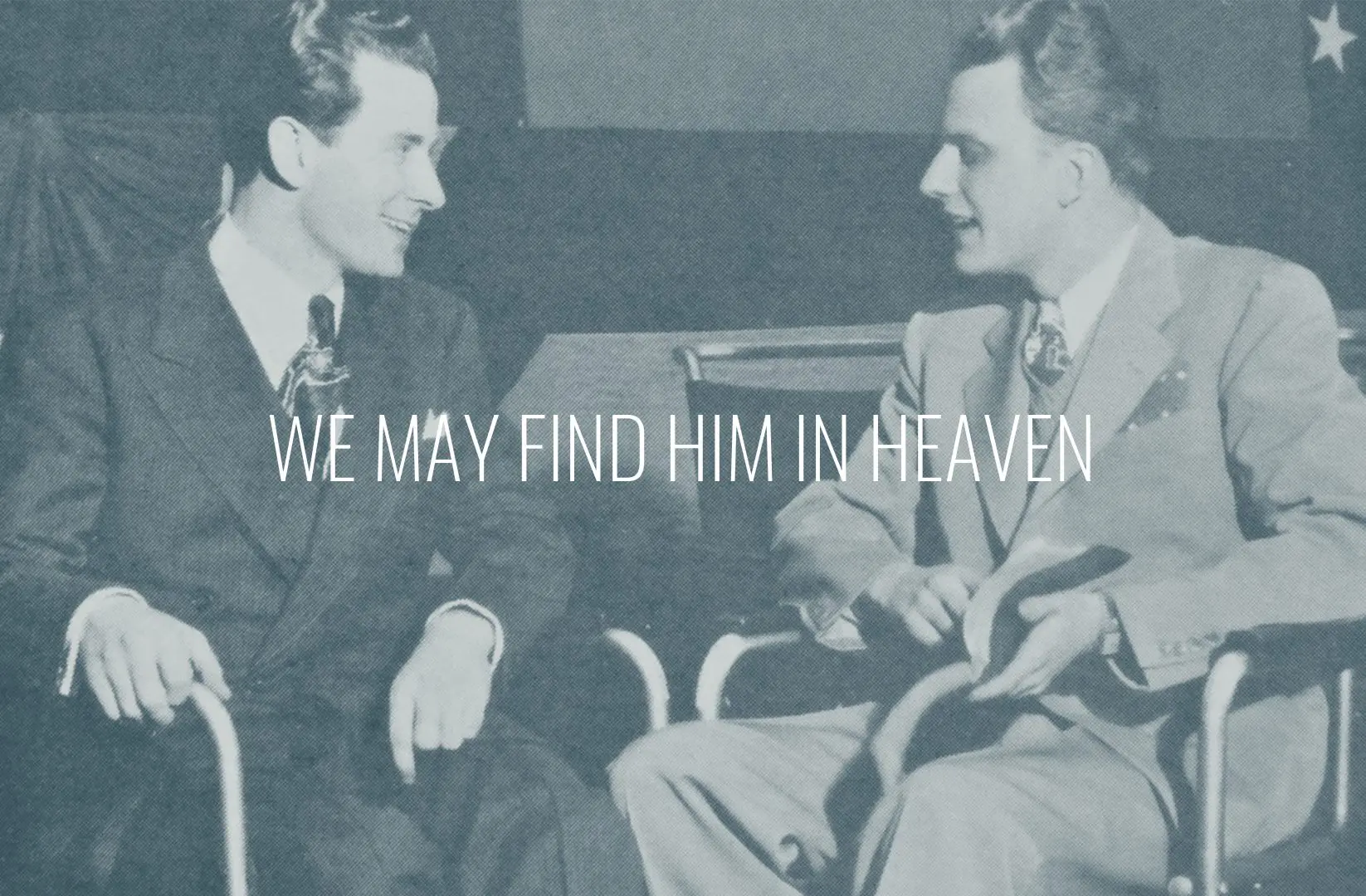
In talked about the following interview in my sermon Sunday, but I thought it was worth repeating in blog form...
The late Charles Templeton was an evangelical minister turned agnostic and was well known for his falling away from the Christian faith. Templeton was a good friend of Billy Graham and toured with him frequently until a nagging skepticism tore him from faith and rationally compelled him to denounce belief in an Abrahamic God. When he brought these very real concerns to the floor of Billy Graham's life, Graham, though shaken, prayerfully determined that he would continue in faith. Templeton, though insisting that Graham had committed "intellectual suicide," noted that for all his perceived faults, in Graham there was "no feigning in him: he believes what he believes with an invincible innocence. He is the only mass evangelist I would trust."
In an interview with Lee Strobel, Templeton expressed that one of the turning points for him was when he saw a photograph of an African woman holding her dead child, a child who died of severe drought, needing only a little rain. How could there possibly be a loving God when all they needed was rain? This infamous problem of evil and suffering, a problem that supposedly shows the maleficence of any omnipotent God that may exist was wholly incompatible with Templeton's belief in an all-loving creator. He went on in his later life to write a rare and intellectually honest book, Farewell to God, where he expresses with deep sadness and regret the untenable philosophical edifices on which his previous Christian life had been built.
"So how in the world, short of a Universalist view of Heaven, could anyone rationally suspect that we may find Templeton in Heaven?"So how in the world, short of a Universalist view of Heaven, could anyone rationally suspect that we may find Templeton in Heaven? I think this may be the case for one very profound reason. He loved Jesus. Probably more than most Christians do. In his interview with Lee Strobel, when Strobel asked what Templeton thought about Jesus, Templeton became relaxed, though morose, as if reflecting on memories of an old friend and said:
"He was the greatest human being who has ever lived. He was a moral genius. His ethical sense was unique. He was the intrinsically wisest person that I’ve ever encountered in my life or in my reading. His commitment was total and led to his own death, much to the detriment of the world."
But there was more to be said. Templeton's heart was still heavy with emotion for this crucified man. Strobel quietly commented: “You sound like you really care about him.” To which Templeton responded:
"Well, yes,” Templeton acknowledged, “he’s the most important thing in my life.” He stammered: “I . . . I . . . I adore him . . . Everything good I know, everything decent I know, everything pure I know, I learned from Jesus."
"And as if his heart could bear it no longer, he bore his eyes to the ground and said, 'I . . . miss . . . him!""And as if his heart could bear it no longer, he bore his eyes to the ground and said, "I . . . miss . . . him!" With that the old man burst into tears; with shaking frame, he wept bitterly. Is there any doubt that this man loved Jesus? He was wrong on so many levels. His literature damaging to and resentful of Christianity. His ideas heresy and his thoughts tangled and unorthodox. Almost everything he believed about faith and religion were and are utterly incompatible with Christianity. But there is one unshakable truth that inflames in me a great curiousity, could this man's heart, so burdened with love for Jesus, be enough? I wonder if he made it to Heaven after all and, quite frankly, I hope he did.
Please Share

Pingback: Did charles templeton come back to christianity? Explained by FAQGuide
Dang. Isn’t that exactly how we all feel when we backslide?? Don’t we MISS Hin and His fellowship and long to be restored when doubt has eclipsed our vision?
The Father’s grip is stronger than mine.
Over the course of my life, now totalling 57 years, I too have had and struggled with a lot of the very same questions that Mr. Templeton also struggled with that lead him to him leaving the Faith. I too for a long period in my life questioned if there was in fact a loving God. So much so that when my now wife and I met she and her friends thought I was an atheist.
I know that God used Mr. Templeton to do far greater things in His name than I ever have or will! After all, who else can have in their Christian resume that they mentored Billy Graham in the ministry? And I also know that Mr. Templeton was greater educated than I will ever be in the Word of God and about our God…. But I can’t help but wonder why it never occurred to Mr. Templeton what God revealed to me in a time of prayer, sealing, and personal conversation regarding why a loving God allows such suffering and heartbreaking situations to some of the very souls that He loves.
God NEVER intended his creation, mankind, to suffer, be ill, lack, want, or die. This was all a result of sin. And that the progression of sin is the reason for these terrible things…. That there will be a place and a time when these terrible things will no longer be and at the same place and time there will also be no more sin. The adversary and sin is the reason for such terrible things in this life and that these things will no longer be when we are one day reunited with our Creator in Heaven!
I also know that a loving God will decide if any of us are worthy of Heaven and that He and He alone will judge us all and that He and He alone knows the heart of each and every man.
I like to think that perhaps Mr. Templeton in his final moments may have reconciled his troubled thoughts with his Lord and Creator?
The Bible teaches us that God’s ways are higher than our ways, his thoughts are higher than our thoughts, and that the Creator does not answer to his creation…. I am often reminded that if we knew everything then where would Faith come into play? Lee Strobel came to the decision that it took more faith to be an atheist than it took to be a believer in Christ Jesus (God).
I also know that the adversary wages his war in our thoughts and minds. And that he has had over 2,000 years to perfect his techniques…
The year Charles Templeton died, my family and I were on holidays out West, viewing the Rockies. The others wanted to go for a gondola ride, I did not. Instead, I preferred to stay back and read a book I had brought along on the trip.
As soon as the others had left, The Holy Spirit told me to pray for Charles. I did.
I take no credit for the impact of my prayers for Charles, but when I learned he had passed, I knew it was no coincidence God had told me to pray for him. To God be the Glory.
I fully expect to see Charles in Heaven. I was touched by Danny’s remarks in a previous email….”The Father’s grip is stronger than mine”. To me, that sums it all up.
Beautiful. Thank you.
It would be far more tragic if Templeton had not been sincere. He apparently lost his faith and having done that he was far better off being honest about it and moving on. How many persons are there that have lost their faith, but for the sake of convenience and social maintenance are insincere?